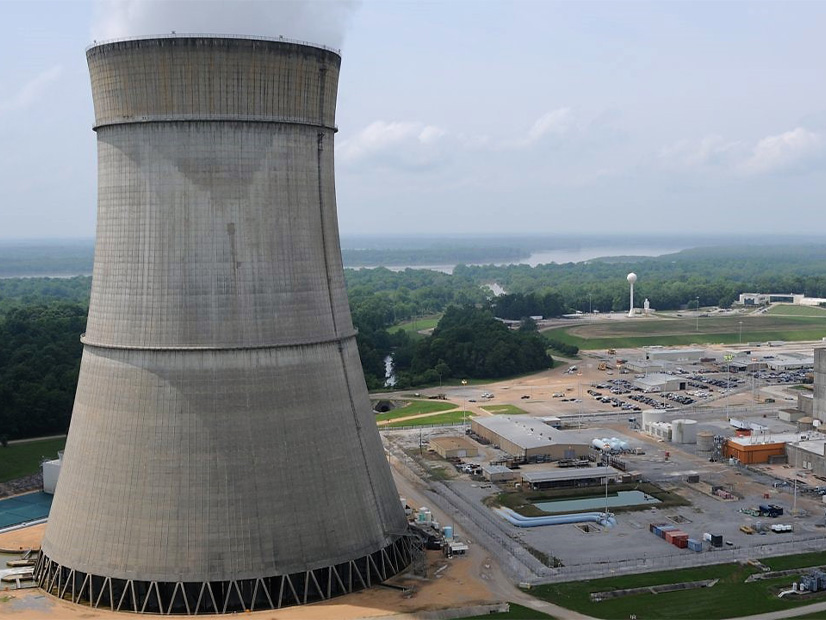The convoluted and long-running clash over refunds due from years of alleged mismanagement and performance issues at Entergy’s Grand Gulf Nuclear Station took another twist last week when regulators accused the utility of publicizing a false narrative.
The Arkansas and Louisiana commissions and New Orleans’ city council filed an emergency motion Jan. 3 after an Entergy press release one week before.
The utility claimed FERC’s recent decision on Grand Gulf tax maneuvers meant it owed no additional refunds to ratepayers. The regulators, who were expecting hundreds of millions in refunds, asked FERC to correct the press release immediately (EL18-152, et al.).
The regulators and New Orleans have complained for years about mismanagement and substandard operations at the nuclear plant and sought refunds and rate reform on more than $1 billion in costs passed on to Entergy customers in their states and Mississippi. They said that despite expensive upgrades, the plant has been plagued by frequent outages at the expense of customers. (See Entergy Regulators Ask FERC to Settle Grand Gulf Dispute.)
The uproar centers on Entergy subsidiary System Energy Resources Inc. (SERI), majority owner and wholesaler of Grand Gulf’s output to Entergy’s Arkansas, Louisiana, Mississippi and New Orleans subsidiaries. In a pair of December orders concerning the nuclear plant, FERC ruled that SERI excluded decommissioning liability accumulated deferred income tax (ADIT) balances in rate bases from 2004 into the present, violating FERC’s tax normalization requirements (ER18-1182).
The commission also decided that SERI overcharged on the $17 million in Grand Gulf annual lease payments it collected from 2015 through 2022, ordering $149 million in ratepayer refunds (EL18-152).
FERC said the refund amount “appropriately captures the revenue requirement impact resulting from the exclusion of all ADIT amounts resulting from SERI’s decommissioning uncertain tax positions during the entire 2004 to present period of noncompliance.”
Entergy CEO Drew Marsh said in the company’s press release that the utility was “pleased that FERC’s remedy results in no additional refunds due to customers beyond those already provided in 2021 on the uncertain tax positions taken by SERI.”
Entergy said FERC’s refund ruling means that the issue will be completely addressed through its previously enacted $69 million rate base credit to customers for Grand Gulf’s expected lifetime and its one-time credit of $25 million in 2021 to remedy 2015’s decommissioning tax deduction.
The company said the commission’s decision stipulated that the refunds must not “re-establish” SERI’s ADIT balances for tax positions that were denied by the IRS and therefore didn’t benefit the company. The utility explained that except for a $100 million partial acceptance of its 2015 tax position, the IRS didn’t permit any of SERI’s other uncertain decommissioning tax positions.
“Under the remedy specified by FERC, for uncertain tax positions that the IRS fully disallowed, and for which SERI received no tax benefits, no refunds are due. We therefore calculate the remaining refund for the uncertain tax positions issue to be $0,” Entergy said.
“The position Entergy asserts in its press release is a blatant and perhaps intentional misrepresentation of the commission’s orders,” the state and city regulators told FERC. “Unless corrected, it may cause substantial damage to Entergy investors and at the least will mislead those investors and the consuming public. A clarifying statement from the commission can diminish these consequences.”
Entergy released a statement on Thursday addressing regulators’ emergency motion. It said it was “following FERC’s regulatory process” and plans to file compliance “detailing the refunds that we believe are required by the FERC order.”
However, the utility doubled down and said SERI owed no additional refunds stemming from its ADIT tax positions.
“As we’ve consistently said, SERI’s tax strategy was conducted in the best interest of our customers and ultimately saved millions of dollars in operating expenses. Those cost savings have already been passed on to our customers, and we believe we have already paid the refunds due under the remedy FERC outlined on the uncertain tax positions taken by SERI,” the company said.
Entergy added that a global settlement of all SERI dockets is in the “best interest of all parties.”
The state regulators and New Orleans also allege Entergy recovered the costs of lobbying, image advertising and private airplane use in rates through the plant’s sales agreement.
Entergy has offered its regulators nearly $600 million to resolve the Grand Gulf complaints, with $235 million to the Mississippi Public Service Commission, $142 million to the Arkansas Public Service Commission, $116 million to the New Orleans City Council, and $95 million to the Louisiana Public Service Commission. Only the Mississippi PSC has taken Entergy up on its offer. (See Entergy Offers Regulators $588M to End Grand Gulf Complaints.)
Entergy also said last week that it will seek a rehearing of FERC’s decision that SERI owes nearly $150 million in refunds because it improperly billed the costs of Grand Gulf’s sale leaseback renewals in its formula rate. The utility said the sale leaseback renewal “was entered into to lower costs to customers, which is a benefit that FERC previously recognized.”




